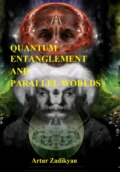
Artur Zadikyan
Jesus and Christ
Chapter 2: Lightning and Thunder

All who lived in the city were slaughtered by the sword by the Israelites – destroyed, put under a spell. There were no survivors left. Jesus burned down Hatzor.
Joshua 11:11. Modern RBO translation
…How often we do not understand, and do not pay much attention to, what is the real cause of the present event. By the formula of cause-and-effect relationship, by the law of repetition, we try to understand the regularities of influence of one event on the fulfillment of another, even if it has not happened yet. And it can be just an ancient religious attitude or a prediction. Becoming an attitude of life, such a thing gets into our consciousness and invisibly forms our worldview, expanding to the level of all mankind. Knowing about some mythical flood, people really expect some catastrophe. Someone, being obviously not optimistic, imagined the merit of mankind in the death of one third of it, allegedly for some sins, and we allow the justice of the realization of such a thing (Rev. 9:18). Without even taking into account that they say this on behalf of the one who atoned for all these (though it is not clear what) sins by his death, being immortal.
And it is not clear whether human consciousness was formed in such a way in the process of evolution and then formed such a worldview – or whether someone, expressing such a vision of the world, from proverbs to divine revelation, formed such a mentality in man.
Any event becomes frightening for us if there is even a delusional prediction of it. However, such delusion plays a positive role, as a person becomes afraid and tries to counteract everything that even does not look like a source of danger, but can lead to similar consequences. As an example: the apocalypse awaits mankind not in the form of another flood, although nuclear war will be both a flood and hellfire.
The harbingers of the apocalypse in the form of wars and major terrorist attacks are never without a religious component, much less a belief in an idea – a kind of religion.
One of the main motives for turning to terrorism is a strong need to strengthen personal identity, which is achieved by belonging to a group. Secondly, there are motives of self-assertion, giving such activity a special heroic significance, etc. And most importantly, terrorism is most often the result of ideological absolutism, a belief in the possession of an allegedly higher truth, a unique recipe for the salvation of one's people or even the entire humanity. And terrorism is not necessarily a localized attack by one or a group of attackers. Terrorism can be expressed in a global war with the use of nuclear weapons. In today's world, it is as relevant as the asteroid fall that led to the death of most of the biosphere.
From time to time we hear: "… another suicide bomber carried out a terrorist attack this morning". Our consciousness, in terms of perception of reality and sense of reality, has become inflamed. Illnesses come in many forms, including not only bodily illnesses. Now pneumonia has struck the mentality, and the "infection" with fatality has infected us with the effect of dumbing down of sensitivity. There is such a peculiar effect of physical "dumbing down" of sensitivity, but I mean spiritual, moral "dumbing down" of sensitivity. It is used to train combat agents of special services or fighters of special brigades. And in general, fighters called up for operations where violence is an accompanying attribute, including the one used against them. Here's a simple explanation. For example, you roar, or even go into hysterical convulsions, when stung by a wasp. And when you are trained, subjected to the same stings for a year, or even more, and even with the use of special drugs, you will be able to dissolve a hive of wild bees. So is the community of people: at the beginning of any social-psychological process, for us, for a society living in appeasement and condemnation of minimal evil, for example, a scandal between a student and a teacher – such an insignificant negative event, a minimal nervous phenomenon – is perceived as something dangerous, terrible and immoral and unspiritual. And when such things become a daily occurrence, then even in relation to something that is much more criminal, such as rape, the scale shifts, the justification of a rapist becomes quite acceptable, because "…a lady with a tarnished reputation". And then there's more. Look at the news, we no longer have the reaction to perceive everything emotionally: there – killed, here – raped, beaten, robbed, dismembered. And it's all over the place. Violence, violence, violence. Some people still somehow want to ask where is God? Because appealing to the authorities is useless. The authorities can not constantly carry out point operations and begin to tighten the general legislation. This raises fears of usurpation of power, tyranny and dictatorship. And we close our eyes again, indignant, and with a sigh we comfort ourselves: it is good that it did not happen to me; or even worse, it cannot happen to me. And I'll tell you: it can, and it can.
I have my own theory about this, and it is that if something happens to someone else, it can happen to you. When thinking about the human psyche, I involuntarily recalled a science fiction story that described the case of a robot android with intelligence. In the story, the ISKIN that possessed a "body" began to be presented to people as crazy, and the reason was that it had become too human. Are we not like that relative to anyone else? We have no one to compare ourselves to in terms of intelligence. If the same gods or highly developed aliens, whom we have imagined in any variety, were in real contact with us, then it would be possible to compare our mind, spirituality, mentality with theirs. But this is the folly and at the same time the arrogant narcissism of man. The fact is that we cannot logically combine one inference from three consecutive logical combinations. We can build one logical line, and even then a small one, out of several logical combinations, and not always and not in all cases. If already two logical understandings have to be combined for one logical conclusion, they either lead to misunderstanding of one of logical concepts, or to a conflict. Chess lovers understand well what I mean, for the rest of you, my smile, and… For the sake of clarity, let me give you an example: the mystery of Dzhokonda's smile lies in the absence of modern dentistry at that time. Now draw conclusions about how many logical combinations are "inside" such a conclusion. When asserting such logical conclusions the following effect can happen: if they are given by a person who has combined such a thing logically and clearly, if even for a long time, and sometimes it is a whole book and even a separate branch in science (agree, the whole book can be a justification of one logical sense, which is usually the case), then we either understand in the end what the point is, or, seeing the agreement with him of understanding, the more "abstruse" personalities (or experts in such a subject), we agree with him, taking what he said on faith. Even this sentence explaining a combination of logical concepts is built on a combination of logical concepts and… is difficult to understand. This is the paradox of faith, the essence of which is: you don't have to understand, but you do have to believe. Although it may not be the truth. Otherwise gods and beliefs would not change in the history of mankind (because the new faith is based on the fact that the old doctrine was false).
So, the following paradox emerges from all this: we, mankind, do not understand the combination of more than two-stage logical thinking. That is, we do not see, for example, in the monumentality of the pyramids of pharaohs the desire to surpass their greatness. We do not see in the history of the greatness of some god the desire of human leaders to immortalize their name by one or another deed, including global wars. And this is the incentive of not only the persons in power. We only assume and, intuitively understanding, still doubt. On this basis we consider as false the meanings that can be understood only by putting three or more logical concepts into a logical combination. This manifests itself in limitation and in not understanding where our action will lead. With experience and knowledge of examples, as they say, with wisdom, man and mankind intuitively begin to assume possible consequences. On this fact are born taboos, rules and belief in an invisible spirit that controls the cause and effect relationship, one that we cannot calculate, but only assume instinctively, based on the same experience of past similar variants. This is in the mass of all mankind, which develops according to the principle of natural selection, according to the main criterion: the goal is the survival of the species. But not selectively, not by choosing the most reasonable. Although in millions of variants it is still the more reasonable, intellectually superior to the general mass of "human beings" who bring civilization to a new stage of development. An example of this could be something that explains what comes as a consequent act from a common knowledge statement. It could be a prediction of the weather in the long term, for example: the summer will be rainy because… the winter was snowless. A variant of this prediction could calculate the outcome of stock market futures for fuel and food commodities. There may be logical combinations, quite distant in a chronological sense, with much larger chains of events that ended up being a factor in the final act. Of such multi-stage logical interrelationships, perhaps the most famous is the following: what is the connection between the fall of a huge asteroid 65 million years ago and the emergence of Homo sapiens? The events seem to be separated by millions, tens of millions of years, but it turns out that they are connected. Although for homo sapiens (man as the dominant species) – maybe, but the mind (the very possibility of thinking in this species of animal) – maybe not. That is, it is quite possible that mind came from external sources (an extraterrestrial civilization or god)… or an intelligent animal species would have appeared, but not man, but something else. Then another question follows from this – why did man appear then? We can argue here for a long time, but let's take Rangit's theory as a basis this time (yes, the intelligence is artificial, but if it is true intelligence, it is guided by logical concepts of inference). He argues: it was this primate, from which humans evolved, that had the greatest, proportionally, variety of variations suitable for an easier way to survive and – most importantly – to perceive all possible radiations (mostly solar, of course), which led to the mutation where it began to understand linear logic. That is, logic in general. And now imagine how long it takes for this homo sapiens to develop so that he could fill the Earth with his society, and after that – so that this society could become minimally reasonable and, of course, cultural at least to some extent, in order to then try to instill in him an understanding of his own mental labor. For example, let's take religious texts that we revere to a greater or lesser degree, the works of philosophers and thinkers, the Bible, the Koran, Immanuel Kant's "Critique of Pure Reason" or Poincaré's "Measurement of Time" (in it he formulated the general principle of relativity back in 1898, before Einstein) – all of us, making a smart face, think that we should be familiar with them, but in fact – we know practically nothing about them. I am talking about linear logic. So what I'm saying with these examples is that we, as a society, need to be trained to understand the works of scientists. But this is the way from simple to complex. But if we think about it a little bit, we can understand why, if there are aliens, they don't contact us. Tell me, if you start explaining the same religious texts, their meaning, abstruse philosophical treatises, the same theory of relativity, what reaction will you have? The overwhelming majority will have a reaction of rejection and indifference. The reason – we do not need it for everyday activities and, let's face it, for comfortable pastime, that is life as such. Their derivatives and consequences – yes, they are necessary, but we do not even notice them. For example, we use navigation devices, search engines, calm our nervous system or stimulate our aspirations, but we do not think much about the fact that all this is based on scientific theories and doctrines of theology about the creation of the world and man's place in it – both in the scientific concept and in the divine one. And certainly we do not need a deep knowledge in the exact sciences to use the instruments or to obtain the services by which certain technical means are created. But, for example, if, as in some religious community, we had to know the Lord's Prayer in order to be admitted to a meal, then we would learn it by heart. Or, to fly on an airplane, we would have to have at least an average knowledge of the techniques used on board, for example, to be able to provide primary medical care, then surely many people would learn it. After all, it is mandatory to study this for space flight. But space flights are not vital in everyday life, so we do not pay so much attention to it so far. We can reason otherwise: those who need us to use air and other transportation services try to make it as easy as possible for individuals to understand complex technology and prevent possible dangerous consequences. For example, no matter how you look at it, everyone should know how to use a fire extinguisher, even if the personnel (e.g., train, cafe, gas station) should be able to put out a fire without fail. This means: innovations that are part of our daily life, we have to learn how to use, for example, a seat belt in cars. But once upon a time, to get a driver's license you had to be able to fix a lot of things in the car: the technique was more primitive, service was not very developed, and difficult situations could arise even because of weather conditions. For example, it would be necessary to start the engine manually, with the help of a "crooked key". If, of course, someone knows what it is.
Or, say, without your knowledge of how new and supernovae stars form, an ambulance would not come to you, you would have studied it, wouldn't you? By the way, they are formed in the following way (this will come in handy later on): two stars (one has already cooled down a bit and the other is still very hot) orbit around each other at a very close distance. There are a lot of star systems like this. Eventually the stars get so close to each other that a huge amount of hydrogen begins to flow from the hotter to the less hot one. When this amount of hydrogen reaches a critical point, a thermonuclear reaction begins – and a massive thermonuclear explosion occurs, resulting in the appearance of a star in the sky, which is called a "new" star. After some time, the surface of the star on which the explosion occurred, cools down – and from the companion star again begins to come hydrogen, creating the conditions for the next thermonuclear explosion. The first such star was observed by astronomers 500 years before our era.
And now imagine the next process in terms of energy scale – the explosion of a new star of such a high power that it leads to a chain reaction and subsequent explosion of the whole star, not just the hydrogen that flowed to it! The scale and power of this explosion are so great that not only it affects significant distances around itself, but also at the place of the explosion instead of the former star a "neutron" star or (if the mass of the original star was significant) a black hole is formed! At the same time, the explosion itself can be observed for 2-3 days, and then only its consequences can be seen.
Such explosions are called supernovae and are much rarer than new explosions. The first supernova explosion was recorded by Chinese astronomers in 164 B.C., and the second – only in 1604. The closest supernova explosion to Earth occurred at a distance of 168 thousand light-years in 1987, and then even managed to record the corresponding neutrino flux. What is this for in our mission? Perhaps it was such an explosion that was perceived on Earth as the phenomenon of the Star of Bethlehem and, accordingly, the start of the story that globally changed and is changing the world. You see, what a connection. And if we take into account the event of the present day, which was influenced by religion (and it could be the history of missionaries to the Indians of America or the aborigines of Polynesia), then the cascade of events that connect cause and effect is mystical.
I am telling this for the following reason: we, people, have created civilization and seem to be proud of it, but we do not want to accept, and sometimes on purpose make a misunderstanding look that it is our fault and even vice – we ourselves are ignorant and destroyers of civilization, i.e. science and culture. That is, we may well go down the path of regression and become feral. Why? Because we do not study this science and culture en masse. To understand this, it is enough to give a few primitive examples. Look, what is the situation (this is what I wrote above): in order for some scientist to promote the fruits of his labor, he needs the public understanding of the result of his work. For example, you have created a measuring tool – a ruler – in a society that does not understand precise measures. So what? You need to form a notion of utility in the household of your invention. It is another matter if something is required by society and your invention is accepted, and even with a reward for you. That was often the case with weapons. But, for example, if you now offer a new technology for reading people's thoughts, it is likely to be of interest only to special services, even if you announce it in public. And in this and similar cases the factor of faith plays the same role as for adherents of religion the hope to be in paradise. If what is claimed is justified and has the attributes of reality, then it is believed. And, for example, only those who have avant-garde-abstract imagination believe in the method of recording consciousness on a material carrier, transferring it to another brain, and even at incredible distances with instantaneous speed by means of the paradox of quantum-entangled pairs. However, it is the future. And, accordingly, it is a component of postulates of new beliefs in the New Age.
It's like the invention of the telephone. When you or those who are interested in your discovery can create a device that is compact, uncomplicated and inexpensive enough to be used by the masses, then your invention will instantly conquer the world. Because it gives them, above all, the comfort of being. But if in order to use it, a person will have to learn a special alphabet, take special courses to use this technique, and if it will require deep knowledge in chemistry and physics – your innovation will be used only in special institutes or similar structures. For the sake of simplicity I will say: the same thing approximately happens when training drivers to get a driver's license, but now the society is reasonable and prepared to understand it quickly. But, for example, in ancient times, when people didn't know the alphabet and only knew numbers up to a hundred, it would have been much more difficult to teach such complex wisdom. Do you understand the comparison? If not quite, imagine that you need to drive a jet airplane, and even a passenger airplane, and even in the area of intensive flights. A simple driver's ed course won't do it. And someday it will become necessary in everyday life, maybe in a slightly different version, but still, as now the ability to drive a car or, for example, the use of options in a smartphone. After all, even now not all sufficiently advanced users can create everything that is possible with the help of various programs. And in the same way programming: now (for now) it is the domain of specialists, but more and more ordinary users need at least a minimal understanding. You got the general point (I hope). I wanted to say: over time, the knowledge that was once the top flight of reasoning and thinking becomes common. And this can be technical knowledge as well as spiritual knowledge. Once it was almost supernatural for society to know about the structure of matter, for example, the existence of molecules. Now any schoolchild knows it, it is not surprising. Now, for example, when we discover life in space, especially intelligent life, at first it will be a sensation, and then, when we realize that life in space is boiling, there are many such systems, it will be something ordinary. It is like a flight into space, which for now is something difficult, expensive and not so necessary for us. But the time will come – we will be trained to drive spacecraft just like driving a car. And finally, one last example to understand some spirituality of people in the society, social order and time where we will go. Once simple truths "don't kill", "don't steal" were elevated to the highest priority for a human being. This happened at a certain stage of society's development in historical progression. As if when it "matured". Before that, society, time after time wanting to follow this, tried to protect itself, while violating these norms. This is the paradox. The society could not compel itself and its individuals to follow this rule, to be vital. Everyone thought: this cup will pass me by, the main thing is to strike first and be strong. But there was always a stronger one for the strong one. And when the society was saturated with atrocities – it thought: where is God? Where is he? Why does he allow such things? So people became disappointed in faith in general. But since the faith in some indefinite protection is formed in human consciousness a priori in the period before birth as a factor of some protected abode, a man, his consciousness, cannot live without faith in the Creator and His care and protection. That's why in such crucial periods for the society's consciousness the faith in the God that is, breaks down, but at the same moment the faith in the new God is born. Just as from belief in the solar God people moved to fire. Accordingly, there is antagonism and conflict of moral postulates. And in moments of crossroads, people often turn to the beliefs of those who already have the religious interpretations they want to have as manifestations of God to them. It is then that they begin to sympathize with the faith of others. So there is a reasonable suspicion: the saying that the chief priests were against Christ is such a diversionary ploy. That was exactly their design. And the whole thing is a huge production with an audience and actors.
Now we are going to the world where the events that took place in our world at the time, which later we defined as the beginning of a new era, are taking place. And there we will try to make adjustments, taking into account our earthly history, so that this, reflected in other worlds, will affect the course of events in our world and prevent the prediction – a certain event, which we call the apocalypse.
Guided by the principle "informed means armed", let us take into account some peculiarities: the first and very important note – in that era, punishment in the form of death penalty was imposed for a small number of crimes, mostly crucifixion was sentenced for political crimes. And non-recognition of the religious cult of the emperor was equated to a conspiracy to overthrow the emperor, an attempt on his life or the lives of his officials. And the religious cult of the emperor's personality meant equating him with the divine essence. Accordingly, asserting oneself as a son of God, vicar of the deity on Earth and the like was an unprecedented insolence and insult to the emperor. As for the method of execution itself – crucifixion – the Romans used it frequently, in all metropolises of the Republic. At home, in their native lands, although they did not execute their citizens (to denote the highest caste), but the method of execution was widely used. Suffice it to recall the three great slave revolts. Let me remind: only supporters of Spartacus were executed more than 6 thousand by the method of nailing to the cross. In Judea no less were crucified in the aggregate. For example, in 4 B.C. the Roman commander Varus crucified 2 thousand Jews. In the times leading up to and after the Gospel events, the Romans carried out many mass crucifixions in the territories where the theater of these events took place, as the historian Josephus Flavius testifies. However, according to the Gospel, Pilate put the fate of Jesus in the hands of the crowd, which demanded his crucifixion, accusing him of heresy. According to the laws of Judea, the punishment for such a crime was stoning. Crucifixion was a Roman penalty for sedition, not for religious beliefs.
That is, Pilate was trying to implement a kind of popular trial or jury trial. But he executed according to Roman rules. That is, he doubted the reality of the threat to Jesus from the high priests. He suspected that there was a playfulness, a spectacle, which always accompanies the struggle for power. He also realized that the representatives of the religious authorities wanted to have Jesus punished by the representative of Rome in order to show the people the unanimity of the imperial power.







